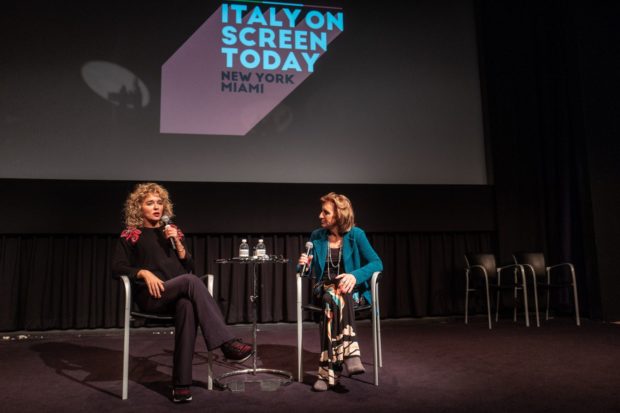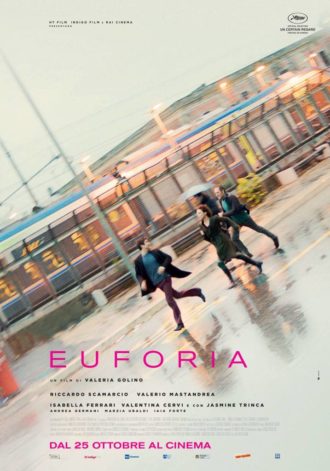Valeria Golino is certainly someone who exudes a certain alluring magnetism, that one thing that you can’t really define, it doesn’t really have a name, it is a mystery, but some people call it: star quality. You can feel it permeating the air, like an exotic fragrance, as she enters a room and you look at her from a distance.
It is if like that epiphanic dream that she embodies on the silver screen breaks through the fourth wall and manifests in flesh and bones in front of your eyes. But as she approaches you and the vision gets clearer, you can really tell that the actress fades away and the woman presents herself. You can see it in her softening traits, in the vividness of her eyes, in her reassuring smile, in the way that she makes fun of herself after she injured an ankle that makes her gait less catwalk like than usual.
There’s also a sweet innocence in her, a jovial breeziness that is somehow far away from the voluptuousness with which she is often portrayed on the big screen. Still, you can’t help but thinking that part of the secret of that sensuality must be held in that innocence.

“I consider myself like a very positive, euphoric person,” she started saying, commenting on her new movie as if she was willing to unveil a little bit of that secret. “When I work as a director, part of the reason why I don’t put myself behind the camera, it is because I don’t find my point of view on myself very interesting. I prefer when somebody else is looking at me through the lens of the cinema, and probably detects parts of myself that are unknown to me and pushes me in other territories, far away from my comfort zone. And that’s also how I like to work with my actors as a director.”
Valeria Golino, the actress, has had quite the exceptional career, representing one of the fewest examples of Italian actresses that were able to cross over internationally. At a young age she started working in Hollywood ultimately becoming a true star with movies like Rain Man (1988), alongside Dustin Hoffman and Tom Cruise; Hot Shots (1991); The Indian Runner (1991) by Sean Penn; Four Rooms (1995) by Quentin Tarantino; or Frida (2002), directed by Julie Taymor. She then had the chance to work in France and in the rest of Europe while collaborating with some of the most Avangard Italian directors such as Citto Maselli, Gabriele Salvatores, Emanuele Crialese, Silvio Soldini, Francesca Archibugi, Ferzan Özpetek, Paolo Virzì, Francesca Comencini.
Her choices of roles have been often unpredictable, out of the box, rich kaleidoscopic portraits of women, from the man-eater to the metaphysical goddess, from the mother to the girl next door. Her instinctual, spontaneous and yet sophisticated acting made her one of the only three actresses in history ever to win the Best Actress award at the Venice Film Festival twice. And she is also the recipient of 4 Silver Ribbon awards, 3 Italian Golden Globe, 3 Golden Ciak and 2 David di Donatello.
Transitioning behind the camera, the actress’s first feature Honey (Miele), starring Jasmine Trinca, debuted immediately in the Un Certain Regard section at the 2013 Cannes Film Festival and won a commendation from the Ecumenical Jury. The movie got rave reviews and has been appointed as one of the strongest actor’s directorial debut ever.

As Golino ventured into making her second movie, the expectations, especially her own, were very high. She felt like she needed to prove something, also she struggled with the challenge to sustain a comical, disenchanted tone in a movie that deals with cancer.
In Euforia, the Italian diva explores the pain and the anguish of saying goodbye to a dying sibling, Ettore (Valerio Mastandrea), whose terminal condition is kept hidden from him by his brother Matteo (Riccardo Scamarcio, Golino’s former husband). Two opposite characters collide, Ettore is a quite school professor living in the suburbs of Rome while Matteo is a successful, openly gay, entrepreneur, who lives an ‘euphoric’ life of luxury and excesses in the center of the Eternal city. Also, in the cast, a set of brilliant Italian actresses: Isabella Ferrari, Valentina Cervi, Jasmine Trinca, Iaia Forte, and Marzia Ubaldi. The movie was again presented in the Un Certain Regard section of the 2018 Cannes Film Festival.
We explored more of the themes and the aesthetic of the movie with Valeria Golino in an outspoken conversation where she also talks about her experience in directing her ex-husband Scamarcio, her American years, the status of the Italian movie industry and why she refuses the stigma of ‘gay-themed’ movie with which part of the press labeled Euforia.
 Tell us more about the themes and the aesthetic of the movie. How much euphoria and hope are there and how much drama and resignation. And how did you find a balance in between these emotions?
Tell us more about the themes and the aesthetic of the movie. How much euphoria and hope are there and how much drama and resignation. And how did you find a balance in between these emotions?
“I can’t really say we can talk resignation in this movie. There is probably fear, anxiety, expectations. Pain and resignation are feelings that are not part of myself generally, even though of course on occasions I feel them. Euforia is a very joyous and yet anxious sentiment. With this movie, I tried to talk about very heavy subjects, deep fears, and also the difficult state of things we are living in today, with a light tone. Also, the aesthetic and the form of a movie is something that interests me as much as the content. But I didn’t want to make too much of a technically beautiful movie because I also wanted to make you laugh and usually formal beauty and funny don’t go together.”
As an actress yourself, how do you approach your work with the actors and how it was working with them in this movie, specifically with Riccardo Scamarcio, with whom you shared an intimate relationship.
“Being an actress myself it certainly helps me working with actors on set. I try to be with my actors the way I hope directors would be with me. I like to look at the actors for real, to understand who they are, I want to feel them protected but at the same time I want to free them, I want them to feel the freedom to experiment with the character. I’m a very passionate director and very a very physical one as well. I like to touch my actors, embrace them, kiss them, I could be sewed for harassment for how much I like to touch them! No just kidding, but I feel them as they were my children, and I want them to be as free as I like to be on set. In this movie, I had the occasion to work with actors that I know very well like Valerio Mastandrea and all of my fellow actress friends. When you work with people who are your friends it is very emotional because you feel like you don’t want to let them down and they feel the same way with you. There’s a bigger sense of duty and respect. With Riccardo, who is the protagonist of the movie, I couldn’t have any real authority with. It is difficult to have authority on someone who is your ex-husband. But I know him so well, I know every single one of his expressions, I know all of his limits and all of his qualities and beauties as an actor. I went deep trying to bring them to the light, and I’m very proud of his work.”
You had a stellar career here in the U.S. What can you tell us of those glorious years? And as an Italian actress who has been successful oversea what is your point of view on the export of Italian cinema today?
“My experience here in America was extremely valuable and formed me so much. I lived 12 years in the U.S. I did almost 18 films, worked with actors who are way better than me and with big directors. I’m always happy when I come back, and I always have some regrets of things that I could have done and that I still want to do in America. I believe that Italian cinema has been rich with a lot of great movies and talented directors these last years. We find our ways to make us visible internationally even though the Italian cinema industry is always a step behind. To export our movies it is so difficult, we don’t have the same support system that French films have for example. There is also something that we need to change culturally because the Italian audience seems disaffected from his own cinema. Despite this, Euforia is doing well, it stayed in the theaters for seven weeks in a row and we felt like it was a miracle for an Italian art-house movie.”
You had the chance to explore the complexity of sexuality and gay characters before in your career. I’m thinking for example of the wonderful portraits of women depicted by Director Rodrigo García in Things You Can Tell Just by Looking at Her, where you star in one of the episodes of the movie alongside Calista Flockhart. Also, recently you have been nominated ‘godmother’ of the LGBTQ-themed ‘Lovers Film Festival of Turin’. Some of the international press though, specifically Variety, has been criticizing how you treated the gay theme in Euforia, calling it an updated, stereotypical portrait of a gay man’s life. What’s your response to this?
“I would say that first of all my opinions as a citizen who fights for civil and human rights is a thing and my artist vision in regard to one movie, in particular, is another thing. I never wanted to treat this as a gay ‘theme’ in my movie. I’m actually fed up with the fact that the gay element still needs to be treated as a ‘theme’. My protagonist in this movie has a number of different traits and one of this is that he is a homosexual. He is also an outspoken, promiscuous homosexual. So, what? ‘Variety’ harshly criticized me when I went to Cannes writing that I brought back the gender films to the 90’s treating my character as a stereotype because he feels sexually free. Maybe I should have made him more loving and willing to create a family, that would have been more politically correct. But I find this the real obscenity, like if it is a shame to be sexually free. I claim the fact that one has to have the freedom of living his sexuality the way that he or she wants. I don’t want to be ghettoized or censored as a woman and as an artist, in this ridiculous media circus we are living today. I’m a free artist, not a prissy one.”











